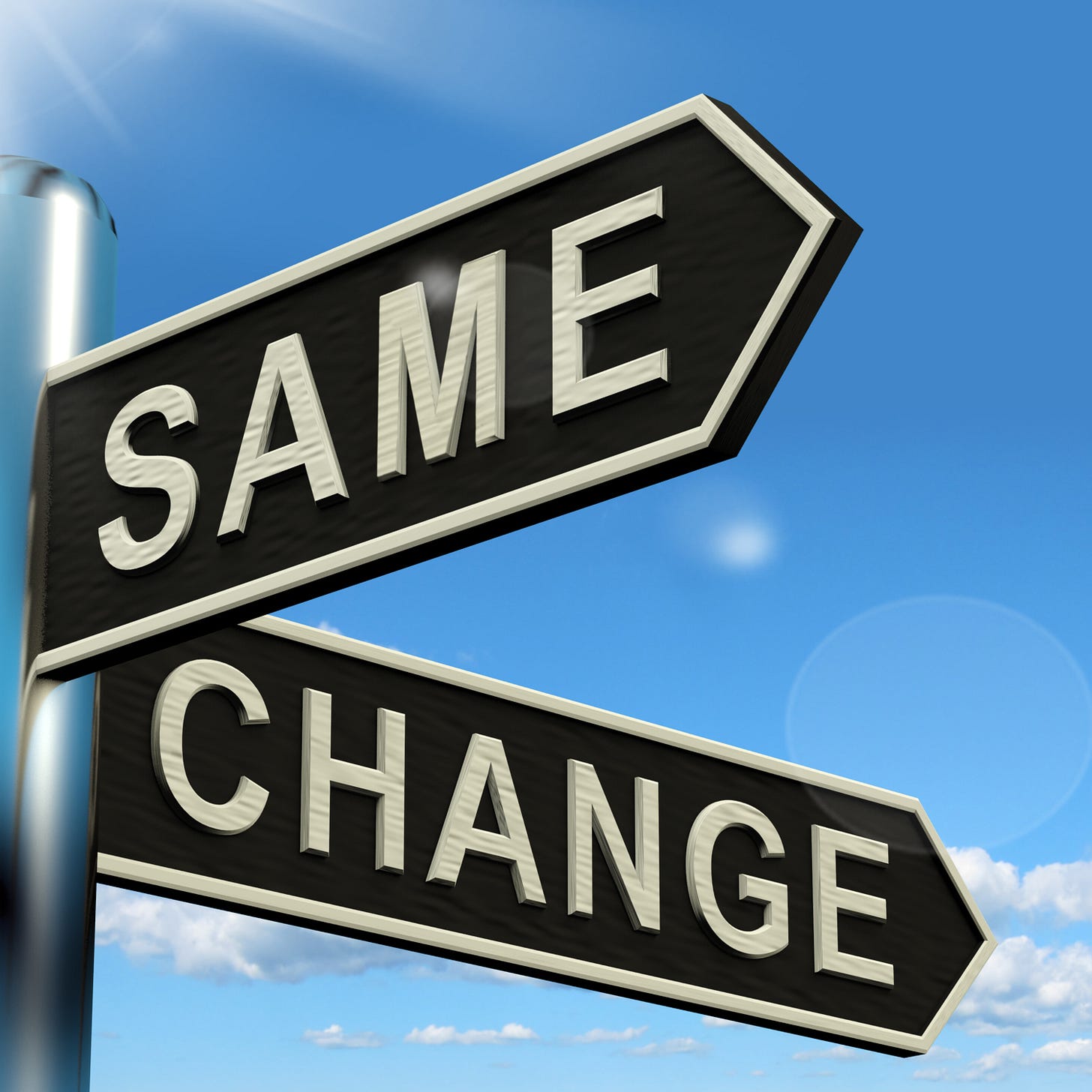It’s uncomfortable to admit, but most people never change meaningfully.
Sure, they might tweak a behavior or two—leave the toilet seat down, remember your birthday, or cut back on late-night snacking.
But those surface-level adjustments aren’t real change. They don’t rewrite the underlying story that defines who they are.
Real change—shifting someone’s identity, core beliefs, and emotional wiring—requires facing profound, uncomfortable truths. It demands questioning the very foundation of who you think you are.
And let’s be honest—that scares the hell out of most people.
We build entire lives around avoiding this kind of work.
From childhood, we learn survival strategies. We figure out what keeps us safe, what earns us approval, and what helps us feel loved—or at least tolerated. Then, we double down on those strategies until they harden into habits.
By the time we’re adults, these habits have become our identity.
• The nice guy who never says no.
• The overachiever who can’t stop proving herself.
• The tough guy who’s allergic to vulnerability.
• The martyr who sacrifices everything and wonders why no one else does the same.
We wear these roles like armor. Even when they stop working and start actively hurting us, we cling to them because letting go feels like death.
Most People Never Stress-Test Their Identity.
We all like to think we’re open-minded. Flexible. Evolving.
But have you ever tested that?
Have you ever had someone challenge your political beliefs, faith, or morals and genuinely listen instead of defending yourself?
Have you ever admitted that something you’ve believed your whole life might be wrong?
Most people don’t. Most people can’t because questioning yourself feels like stepping into quicksand.
It’s terrifying.
So we avoid it.
We surround ourselves with people who think like us, seek opinions that reinforce our beliefs, and reject anything that makes us uncomfortable.
We’re not changing. We’re doubling down.
You Can’t Change People. Period.
I wasted so much of my life believing I could change people.
I thought if I loved them enough… if I supported them enough… if I bent over backward and set myself on fire to keep them warm… they’d finally see me. Finally, they’d love me back the way I needed them to.
I tried it with my ex-wife.
She was controlling, manipulative, and unwilling to meet me halfway. And I stayed. I kept believing that if I just tried harder and sacrificed more, she’d soften.
She didn’t.
Because she didn’t want to.
I had changed so much of myself to accommodate her that I barely recognized who I was anymore. And still, she wouldn’t budge.
The truth?
I didn’t want her to change.
I wanted a different wife.
But instead of facing that truth, I spent years hoping she’d become someone she wasn’t.
The Only Person You Can Change Is You.
When I finally admitted to myself—and her—that I didn’t want to be in the relationship anymore, it was like waking up from a coma.
For the first time, I saw her.
She wasn’t the villain. She wasn’t evil. She was just… her.
And I didn’t want that.
Not because she was broken. But because we weren’t a fit.
I had spent years abandoning myself, hoping she’d change and calling it love.
But real love doesn’t require you to betray yourself.
Are You Making This Mistake Too?
Be honest—are you in a relationship secretly hoping the other person will change?
Are you excusing behavior you know you shouldn’t?
Are you ignoring red flags because you think “it’ll get better”?
Are you waiting for them to wake up one day and suddenly become the person you need?
Here’s the truth:
People don’t change because you want them to.
They change when they want to.
And even then? Most don’t.
So What Can You Do?
You stop waiting.
You stop chasing.
You stop hoping for a miracle that isn’t coming.
And you ask yourself the fundamental question:
Can I live with this?
Not can I fix it? Not can I tolerate it for now?
Can I live with this—exactly as it is—for the rest of my life?
If the answer is no, you know what to do.
Stop Sending the Wrong Message.
When you stay with someone who doesn’t treat you well… when you let disrespect slide… when you keep showing up for someone who takes you for granted…
You’re teaching them that it’s okay.
You’re telling them, this is acceptable.
That’s not love.
That’s self-abandonment.
What Does Real Change Look Like?
Real change doesn’t come from wishing and hoping. It comes from drawing a line, from saying, “This is what I need, and I won’t settle for less.”
Real change happens when you finally see yourself as worthy of respect, love, and reciprocity.
Because the truth is, change isn’t hard.
What’s hard is choosing it.
Walking away from what’s comfortable—even when it’s killing you.
Facing the unknown—even when it’s terrifying.
Believing you deserve more—even when no one else has ever treated you that way.
Let Go of Who They Could Be.
This might be the hardest part.
You have to let go of the version of them you built in your head—the person they could be if they tried harder, loved you more, or just “got it.”
You have to mourn that fantasy.
Because it’s not real.
And if you keep clinging to it, you’ll miss out on the genuine relationships. The ones where you don’t have to shrink, beg, or explain your worth.
Most People Never Change—But You Can.
You can change how you see yourself.
You can change what you tolerate.
You can change the direction of your life.
And when you do?
The right people—the ones who don’t need fixing—will show up.
But only when you stop chasing the ones who won’t.
Until next time,
Anton
Dancer, Writer, Buddhist
P.S. If this resonates, forward it to someone who needs to read it.
Permission to be Powerful is a reader-supported publication. To receive new posts and support my work, consider becoming a free or paid subscriber.












